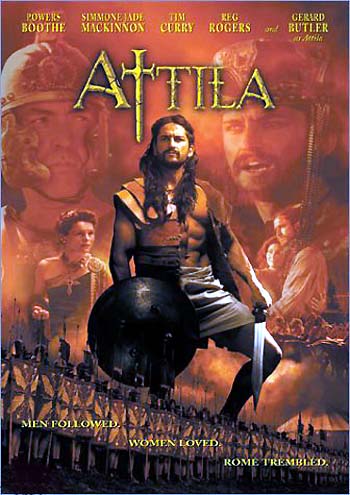- Attila (TV miniseries)
Infobox Film
name = Attila

director = Dick Lowry
producer = Caldecot Chubb (executive producer)Sean Daniel (executive producer)James Jacks (executive producer)
Michael R. Joyce (co-executive producer)
Paul Lichtman (producer: Europe)
Judith Craig Marlin (associate producer)
Robertas Urbonas (producer: Europe)
writer =Robert Cochran
starring =Gerard Butler Powers Boothe
Simmone Mackinnon
music =Nick Glennie-Smith
editing = Tod Feuerman
distributor =Universal Studios
released =2001
runtime = 177 min.
language = English
imdb_id = 0259127 |Infobox movie certificates
United_States = Not Rated"Attila" (also known as "Attila the Hun" in the UK), takes place during the waning days of
Roman Empire , the barbarianHuns are making their way towardEurope . A warrior named Attila violently assumes Hun leadership and unites the warring clans under his banner. But this is not enough for him, Attila seeks to form an empire, and he seesRome , bristling under the leadership of the incompetent Caesar Valentinian, as ripe for the picking. In an attempt to quell a Hun invasion, ambitious Roman GeneralFlavius Aetius attempts to form an alliance against Attila against their mutual enemy, Visigoth King Theodoric. But this plan backfires, and it soon becomes clear that a violent showdown between all three armies awaits.Miniseries Synopsis
Two worlds collide, along with the two men who embody the values and essence of these worlds. Attila, King of the Huns (
Gerard Butler ), is a visionary who sees more in his people than they see in themselves. While the Huns are content to plunder and extort the surrounding nations, Attila looks beyond to the possibility of an empire and new world order. Roman GeneralFlavius Aetius (Powers Boothe ) embodies the best and the worst of Rome in the final years of her existence. He is motivated by one overriding goal: Rome must continue to rule the world. Two different visions of destiny, held by the two strongest men of the century' these conflicts are at the heart of Attila the Hun.Cast
*
Gerard Butler -Attila the Hun
*Powers Boothe -Flavius Aetius
*Simmone Jade Mackinnon - N'Kara/Ildico
*Reg Rogers -Valentinian III
*Alice Krige - Placidia
*Pauline Lynch - Galen
*Steven Berkoff - King Rua
*Andrew Pleavin -Flavius Orestes
*Tommy Flanagan -Bleda
*Kirsty Mitchell -Honoria
*Jonathan Hyde -Flavius Felix
*Tim Curry -Theodosius II
*Rollo Weeks -Attila the Hun Historical Inaccuracies
*There is no evidence that Attila ever spent time in Rome, although Aetius was a hostage for a time among the Huns.
*The Romans are portrayed in standard Hollywood terms, decadent pagan orgies and all - whereas in reality by this stage they had converted to a particularly stern and moralistic Christianity.
*The film depicts theBattle of Chalons as the last major campaign of Attila's career, entirely omitting his campaign the following year inItaly , during which he very nearly sackedRome but stopped just shy of Rome for reasons that are currently unknown, but under heavy debate.
*Attila's first wife, N'kara, is entirely fictional as is the daughter of Aetius/Theodoric - although the fact that Attila had adult sons by his death does suggest that he had been married before - perhaps many times. Aetius however did have a son named Gaudentius
*Some historians contend that the Huns were ofTurco-Mongol descent, as opposed toIndo-European as portrayed here - others however now discount any connection with the Mongolian Hsiung-nu and point out that whatever their original point of origin, by Attila's time they had heavily intermarried with western tribes. In fact at least one Hun in the film (Bleda) is made up to look 'mongoloid' - although oddly his uncle (Rua) and brother (Attila) are not.
*The Roman helmets that appear here are the classical Roman helmets although they had in reality abandoned this armor for the more cost efficientCoolus helmet
*The Roman shields and weapons resemble that of the early empire instead of the late.
*Both Roman and Hun riders use stirrups which were not introduced into Europe until several centuries later.
*Virtually all the swords shown in the film are much too short - in fact virtually every army in the period used some variant of the spatha or longsword as this gave a much longer reach used from horseback.
*The siege engines used by the Huns are clearly trebuchets operated by counterweights which did not reach Europe until centuries after Attila - rather they should have been torsion-powered catapults.
*The Roman EmperorValentinian III is depicted as childish, decadent and idiotic, while in truth he probably was a mature but incompetent ruler.
*Galla Placidia was dead by the time Valentinian murdered Aetius.
*There are no records that back up the notion that Theodoric and Aetius shared the same wife.
*The Roman Army's uniforms are anachronisms by the time of the 5th century.
*Aetius' depiction in the film as a sinister anti-hero is almost fictional. Although he was ambitious he was probably a more noble and honorable man in character.
*As with many films portraying the waning days of the Roman Empire, the capitol city in the movie is Rome, when in fact the capitol had moved toRavenna by the time period portrayed in the film.
*While Theodoric was killed in the battle, the perpetrator was either an anonymous Hun, or possibly Andag, an ambitious fellow Goth. There are no historians who support a Roman conspiracy theory for his death.
*Atilla did not kill Bleda immediately after their uncle's death. In fact they were co-rulers for 11 years, before Bleda died under mysterious circumstances. While its speculated that Atilla did murder his brother, it was certainly not done in a public challenge.References
External links
*imdb title | id=0259127 | title=Attila
Wikimedia Foundation. 2010.
